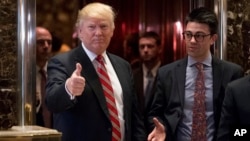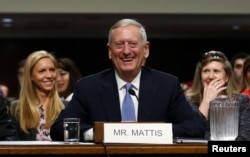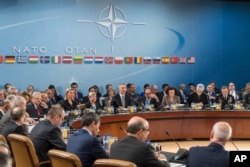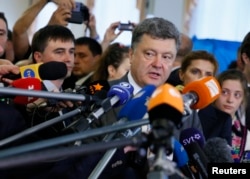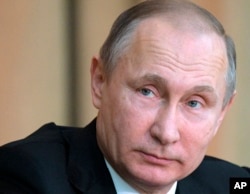European governments struggled Tuesday to assess whether outspoken remarks by U.S. President-elect Donald Trump, made in a weekend interview with two European newspapers, will be translated into new policies.
European leaders had hoped that as Trump’s inauguration approached, the president-elect would tone down his campaign-trail criticism of the European Union and NATO, which he has dubbed “obsolete.”
They had thought his views would come to align more closely with those of some of his top national security nominees, such as likely defense secretary retired Gen. James Mattis, who at his Senate confirmation last week accused Russian President Vladimir Putin of trying to foment a break-up of the Western alliance.
“If we did not have NATO today, we would have to create it,” Mattis said at the hearing.
But Trump renewed his criticism of NATO and the European Union in his interview with London’s Sunday Times and Germany’s Bild newspaper, prompting frustrated remarks from the likes of German Foreign Minister Frank-Walter Steinmeier.
Trump’s NATO stance “contradicts what the American defense secretary said in his hearing in Washington only a few days ago,” Steinmeier complained.
European leaders and officials differ on how to approach Trump and they disagree about what might unfold as the real-estate tycoon’s administration begins. Will his Tweets and off-the-cuff remarks be translated into policy?
Wait-and-see strategy
Some Europeans favor a wait-and-see strategy. The characteristically guarded German Chancellor Angela Merkel, for example, limited herself to a few terse comments about the interview, and did not respond directly to Trump's assertion that her refugee policy has been a disaster.
The German leader has also ignored Trump’s endorsement of Brexit and his dismissal of the EU as just a “vehicle for Germany.”
"When he is in office, and at the moment that's not the case, we will work with the new American government and see what kind of agreements we can reach,” she said.
But other European politicians are arguing Europe needs to push back hard on the American president-elect.
As she entered a meeting of EU foreign ministers Monday, the bloc’s foreign affairs head Federica Mogherini stressed that European governments intend to stand by the Iran nuclear accord, which Trump has threatened to rip up. "It is proof that diplomacy works and delivers," Mogherini said.
The wait-and-see camp of Europeans argue that governing will change Trump. But members of the push-back camp doubt that Trump will change or moderate.
"I hope that the Congress, even with a Republican majority, will impose some limits in the long term," said Bundestag deputy speaker Ulla Schmidt. Thev Social Democratic Party legislator told Deutsche Welle: "I hope that not the man changes the office, but the office changes the man.”
NATO
During the presidential campaign, Trump warned the U.S. might not support NATO members in a crisis unless it was “reasonably reimbursed.” In his weekend interview he reiterated his frustration over the failure of many alliance members to meet their defense spending obligations, suggesting to many that his views are unlikely to change.
“Anyone who thought Trump would be more moderate after he was elected will find himself disappointed," said Schmidt’s SPD colleague, Rainer Arnold.
And Norbert Röttgen, chairman of the German parliament’s foreign affairs committee, wonders whether Trump even believes in the idea of the West.
“Perhaps one could say that in reality in his thinking the West does not exist,” Röttgen told German public radio. “Whether the EU is divided or contested doesn't matter to him, whether NATO is there or not, doesn't matter to him. It's obsolete to him anyway.”
Further east, in states even closer to Russia, the fear is that a newly assertive Kremlin may feel free to challenge NATO more vigorously that in the past. "If Trump steps back then that will be an invitation for Putin to step forward,” worried Igor Sutyagin, a Russian arms control expert now at the Royal United Services Institute, a London-based think tank.
Ukraine
Ukrainian leaders having become increasingly alarmed at Trump’s talk of being able to make a deal with Moscow. In the weekend interview, the incoming president suggested that Ukraine-related sanctions on Russia might be lifted in exchange for a reduction in nuclear weapons.
Ukrainian President Petro Poroshenko has urged that the sanctions remain in place as long as Russia continues to hold Crimea, seized in 2014, and provides support for pro-Russian rebels in eastern Ukraine. “Ukraine realizes that it is not Moscow’s only enemy – all those who propound democratic values are Moscow’s enemies. That is why today the defense of Ukraine is the defense of the values of the free world,” he said.
Putin
Talk of an early summit between Trump and Russian President Vladimir Putin is further alarming the continent. According to the London Sunday Times, Trump’s first foreign trip as president could be to Iceland for a summit with the Russian leader — a summit that could happen before the new U.S. leader has met with most NATO leaders.
Trump aides are denying any such plans, but British officials have told VOA they understand consideration is being given to a Trump-Putin summit within a matter of weeks.




